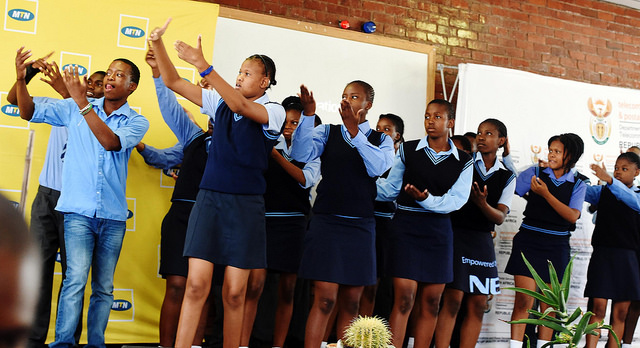
During his inaugural state of the nation address, President Cyril Ramaphosa announced that the first National Senior Certificate (NSC) examination on South African Sign Language (SASL) will be implemented and offered to deaf learners at the end of 2018. However, as with many of the other promises made on the night, there was no elaboration on the implementation. The Daily Vox team takes a further look.
The implementation of SASL as a first language matric examination is ten years in the making.
In 2009, a deaf learner, Kyle Springate, from Westville Boys’ High took the department of education to court with an application to have sign language declared as an official matric subject and official language at schools.
He had been studying the subject all throughout his high school career and it was only two months before his final examinations that the department informed him that SASL was not a recognised matric subject. The department opposed Kyle’s application in court. However, the court at the time ruled that the education department should offer SASL as a subject. Now finally the process of implementing SASL as a matric first language is in its final stages.
Dr Moses Simelane, the inclusive education director at the department of basic education said in an interview with The Daily Vox that in terms of preparing for the rollout, Grade 12 teachers of SASL began training in 2017. Language subject advisors have also been brought in to monitor and support the implementation.
The department has already developed and distributed exemplar papers to strengthen the school assessments while UMALUSI, the Quality Council for General and Further Education and Training, have been engaged to ensure the quality of the process.
Simelane said that writing the examination in this subject may not mean immediate access to jobs, but the department does envisage that those who will achieve well at the NSC will gain entry to universities for further studies, as it has not been the case over the years for most students.
Odette Swift, director of Deaf Education at Deaf SA said in an interview with The Daily Vox that her organisation is delighted that SASL is being offered and officially recognised. But they have concerns regarding the quality of the rollout of the subject and the extent to which the Deaf community have been involved in the development of the subject.
Speaking on the impact this will have on deaf school-leavers, Swift said “This is the first time in a long time that deaf school-leavers will have two language subjects… Additionally students will have pride in a language that is their own.”
Swift says this will also mean students will be getting a better matric as before some deaf students got an endorsed matric which could not be used when applying to higher education institutions.
Speaking to The Daily Vox, Cara Loening from Sign Language Education and Development (SLED) said a lot needs to be ironed out in terms of tertiary education, but it does open many more doors.
“They [the deaf students] will then be getting a proper matric. Before it was always an endorsed matric because they only wrote one language. Now they will be writing two languages, SASL and English at most schools,†she said.
For a long time, the South African National Deaf Association (SANDA) have been campaigning for SASL to be recognised as the 12th official language in South Africa. In March 2017, the association, along with members of the Deaf community, signed a memorandum asking for the government to look into elevating the lives of the Deaf community, especially for students going into universities.
At the time, the CEO of SANDA Jabulane Blose said that the legal recognition of the language would promote deaf people’s equal participation in society.
“The challenge is that there are only a few institutions offering Sign Language at the moment. There is limited access to it,” said Blose.
There was the Talk Sign campaign which was launched in KwaZulu Natal earlier this month. The aim of the campaign is to create awareness among the South African hearing community to make them more sensitive to the needs of the deaf and hearing loss. The campaign hopes this will promote sign language. The Talk Sign campaign is also part of the drive to get SASL approved as South Africa’s 12th official language. This is an ongoing campaign.
Additionally, in 2015 the Human Rights Watch released a report called “Complicit in Exclusionâ€: South Africa’s Failure to Guarantee an Inclusive Education for Children with Disabilities. This report found that South Africa was failing in its duties to ensure that children with disabilities would get an inclusive education. The problems include being taught by teachers who are not equipped to support the learners as well as children not learning the same things as children without disabilites.








